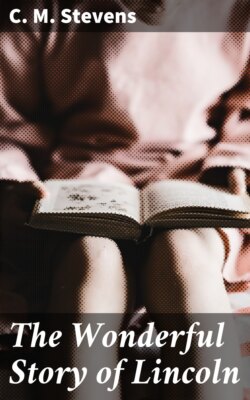Читать книгу The Wonderful Story of Lincoln - C. M. Stevens - Страница 12
На сайте Литреса книга снята с продажи.
V. WAY-MARKS OF RIGHT LIFE
ОглавлениеTable of Contents
Lincoln’s new mother had three children of her own, but under her management they all lived together, in the one-room house, in perfect harmony and friendship.
Of the little Lincoln boy she said, “His mind and mine, what little I had, seemed to run together.” She said that there had never been a cross word or look between them and that she loved the little fellow as her own child. One thing is sure, to the American people, Sarah Bush Lincoln has forever given a sacred meaning to the name stepmother and hallowed its duties near to the meaning of mother.
In her old age she was visited by a biographer of Lincoln, to whom she said, “I had a son John, who was raised with Abe. Both were good boys, but I must say, both now being dead, that Abe was the best boy I ever saw, or expect to see.”
Lincoln’s sister Sarah, or Nancy, as she was also called, was a noble girl and was of inestimable help to Mrs. Lincoln in the labors of a pioneer home. She was quick to learn and she did her share in helping her brother in his desire to learn. There was nothing remarkable about that brother, he was not wondrous, except in one thing, and that was his unceasing zeal to have a greater mind, and for that mind to be a right mind.
His first real school life was to travel a deer path through the deep woods, nine miles each day, to school.
He had no time to waste on useless knowledge. Josh Billings once exclaimed, lamenting, “What’s the use of larnin’ so much that ain’t so.” Lincoln thought there was no use in such foolishness, and he sought to fill his mind only with useful information, valuable toward a greater life.
For instance, he got hold of a small dictionary and he read it through and through with the eagerness that many people give to baseball news or a novel. When the book called the “Statutes of Indiana” fell into his hands he could hardly eat or sleep till he had read it through. When he finally got hold of a grammar, it was no dry reading to him and no task. He literally devoured its information and committed its principles to memory, as a value of the finest wealth. He was indeed remarkable or wondrous in nothing but the divine inspiration to enlarge a useful mind. These are the minds that make life worth living and invariably characterize the builders of the world.
It appears that the first approach of Lincoln to the formation of a life-ideal, his first patriotic vision of American citizenship, was derived from reading a life of Washington. A friendly neighbor loaned him the book. His book-shelf was a chink in the log house. One night it rained into his book-shelf and the next morning he found his borrowed book bucked up into a most unreadable shape. Lincoln’s introduction to Washington was unhappy and significant. Trivial as the incident might seem, it supplies suggestions of character on the way of superior worth to civilization. Events, one by one, build up or tear down together the structure of self or of the public system.
The Lincoln boy could have shielded himself, as to the damaged book, behind personal irresponsibility for an accident, or he could have flatly refused to make good. If so, we may well guess that he would never have been President of the United States, and would never have served America in its dire peril so as to be honored by the whole world. He was not that kind of a character. As we trace the steps of moral integrity, the trivial incident becomes powerfully significant. The Lincoln boy made good. He worked three days for the owner of the damaged book, so that another should not suffer loss through any kindness or good-will to him; also, beyond that, he could have no rest nor peace while any wrong existed between him and another man.
From that time on he had before him the vision of a great American. Washington became his ideal type of character, and that ideal no doubt helped much to make him the patient power he was in the great crisis of his nation’s existence.
The rough and hard never hurt any one if they are healthy interests; the rude and uncultured wrong no taste if they are moral; and poverty injures nobody when it is clean and persevering and safe. So the hard requirements, rude living and destitute means only strengthened the boy more and more for the heroic responsibilities requiring such a type of manhood.
It is said that he memorized and often repeated for self-encouragement the homely old verses of the song, “Try, Try Again.”
“When you strive, it’s no disgrace
Though you fail to win the race;
Bravely, then, in such a case,
Try, try again.
That which other folks can do,
Why, with patience, may not you?
All that’s been done, you may do,
If you will but try.”
In a copy book the following lines, still preserved, were written by Lincoln:
“Abraham Lincoln
his hand and pen.
he will be good but
God knows when.”
This pathetic glimpse of the childhood dream may account for his profound interest in boys and boyhood. When he had reached world-wide fame he said, “The boy is the inventor and owner of the present, and he is our supreme hope for the future. Men and things everywhere minister unto him, and let no one slight his needs.”
Lincoln reading by Firelight.
